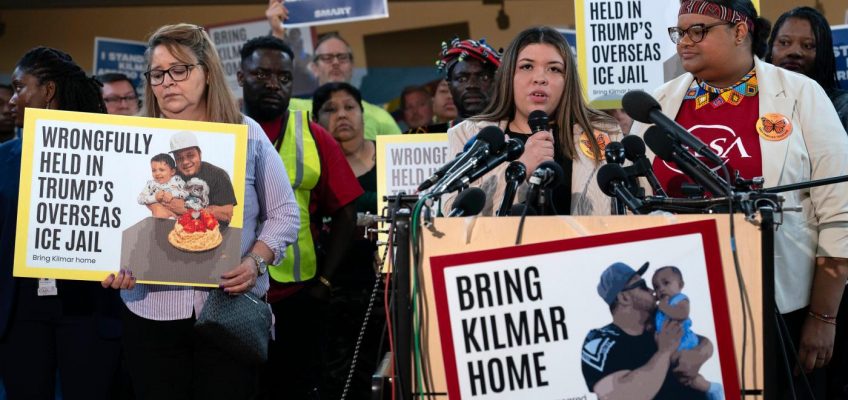By MICHAEL KUNZELMAN and BEN FINLEY
A federal judge in Maryland is expected to question the Trump administration Tuesday about its continued refusal to retrieve Kilmar Abrego Garcia from an El Salvador prison, even after the Supreme Court ordered his return to the U.S.
The 4 p.m. hearing in a U.S. District Court comes a day after White House advisers repeated the claim that they lack the authority to bring back the Salvadoran national from his native country. The president of El Salvador also said Monday that he would not return Abrego Garcia, likening it to smuggling “a terrorist into the United States.”
Abrego Garcia, 29, lived in the U.S. for roughly 14 years, during which he worked construction, got married and was raising three children with disabilities, according to court records.
A U.S. immigration judge had shielded Abrego Garcia from deportation to El Salvador in 2019, ruling that he would likely face persecution there by local gangs that had terrorized his family. He also was given a federal permit to work in the United States, according to Abrego Garcia’s lawyers.
But the Trump administration expelled Abrego Garcia to El Salvador last month anyway. Administration officials later described the mistake as “an administrative error” but insisted that Abrego Garcia was a member of the MS-13 in the U.S.
Abrego Garcia was never charged with a crime and has denied the allegations, according to court records. The accusation stems from 2019, when Maryland police arrested Abrego Garcia while he was looking for work as a day laborer outside a Home Depot.
The allegation was based on Abergo Garcia wearing a Chicago Bulls hat and hoodie and the word of a criminal informant who worked with police in Maryland’s Prince George’s County, court records state.
Abergo Garcia’s attorneys have pointed out the criminal informant alleged he was a member of MS-13 in Long Island, New York, where Abrego Garcia has never lived.
The allegation was enough for a U.S. immigration judge to keep Abrego Garcia in jail as his immigration case proceeded in 2019, court records state. And a board of appeals backed that judge’s decision.
But the U.S. immigration court ultimately released Abrego Garcia from custody once he was granted protected status from being deported back to El Salvador, according to court records.
U.S. District Judge Paula Xinis had ordered the Trump administration in early April to bring Abrego Garcia back. And the U.S. Supreme Court agreed on Thursday that the U.S. government must “facilitate” Abrego Garcia’s release.
But the White House has balked at trying to broker his return, arguing the courts can’t intrude on the president’s diplomacy powers.
Tuesday’s hearing could include strong words from Xinis. She had lambasted a lawyer for the Trump administration at a court hearing on Friday when the attorney couldn’t explain what, if anything, the administration has done to arrange Abrego Garcia’s return.
Xinis ordered the U.S. on Friday to provide daily status updates on plans to return Abrego Garcia. The Trump administration responded Saturday that he was alive in the notorious El Salvador prison. But it has only doubled down on its decision not to tell a federal court whether it has any plans to repatriate Abrego Garcia.
In its filing to the judge on Monday, the Trump administration repeated the statement made by El Salvador President Nayib Bukele.
“How can I smuggle a terrorist into the United States? Of course I’m not going to do it. The question is preposterous,” Bukele said.
In a filing with the U.S. District Court on Tuesday, Abrego Garcia’s lawyers cited Thursday’s order from the Supreme Court to facilitate his return.
“To give any meaning to the Supreme Court’s order, the Government should at least be required to request the release of Abrego Garcia,” the attorneys wrote. “To date, the Government has not done so.”
The attorneys also rejected the idea that the U.S. lacks the authority to retrieve him. They noted that the U.S. is paying El Salvador to hold prisoners, including Abrego Garcia, and “can exercise those same contractual rights to request their release.”
Bukele struck a deal under which the U.S. will pay about $6 million for El Salvador to imprison Venezuelan immigrants for a year. Trump has said openly that he would also favor El Salvador taking custody of American citizens who have committed violent crimes, which is likely illegal.


Leave a Reply